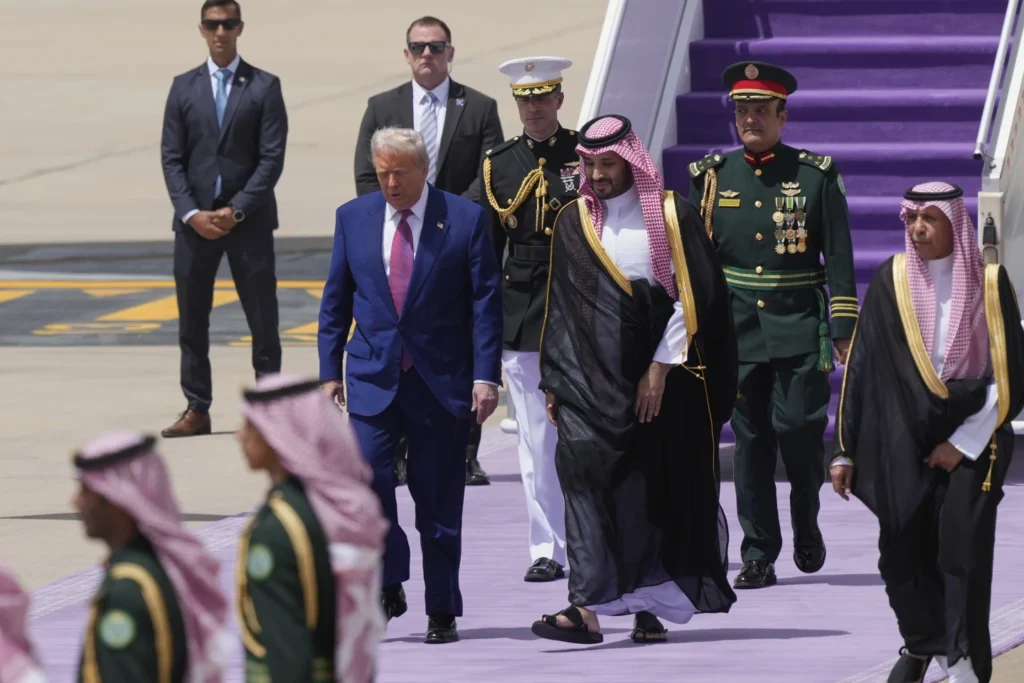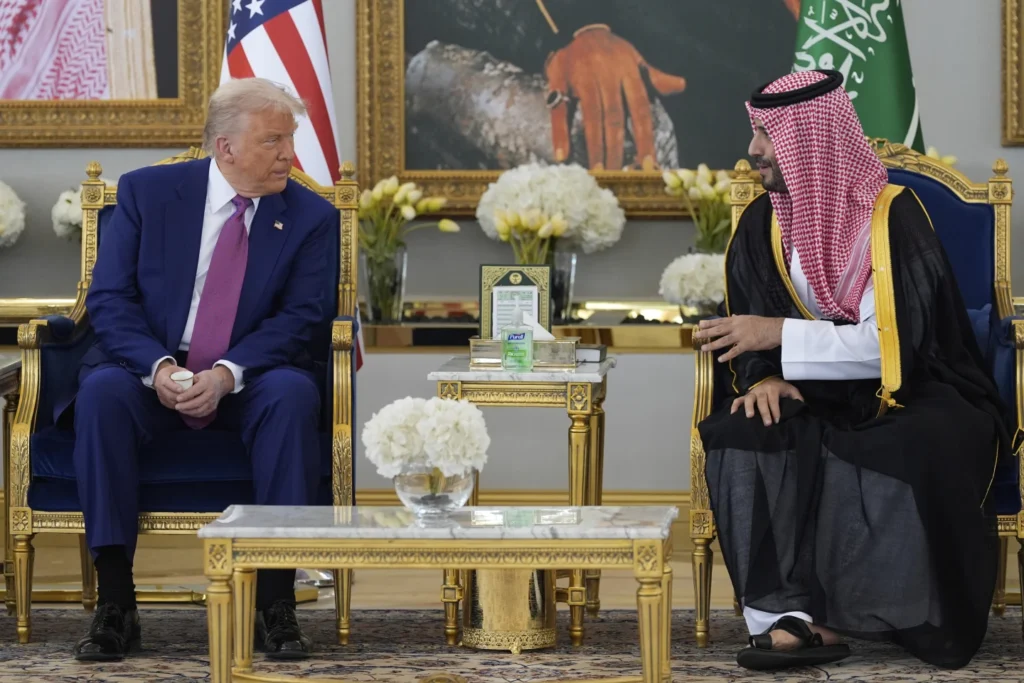RIYADH, Saudi Arabia — President Donald Trump began a pivotal four-day diplomatic mission across the Middle East on Tuesday, landing in Saudi Arabia for high-level talks with Crown Prince Mohammed bin Salman aimed at curbing Iran’s nuclear ambitions, resolving the Gaza conflict, and bolstering economic ties through energy cooperation and investment.

Trump was met with a warm reception as he stepped off Air Force One at King Khalid International Airport, where the Saudi crown prince personally welcomed him — a symbolic gesture underscoring the strong personal rapport between the two leaders. The welcome was marked by royal pageantry, with Saudi F-15 fighter jets escorting the presidential aircraft into Riyadh’s airspace in a ceremonial display of alliance.
Shortly after landing, Trump joined the crown prince in a grand reception hall at the airport where traditional Arabic coffee was served by attendants in ceremonial attire. The gathering included a private lunch at the Royal Court, where Trump, bin Salman, and senior advisors were joined by top American business leaders, including Blackstone CEO Stephen Schwarzman, BlackRock CEO Larry Fink, and Tesla and SpaceX CEO Elon Musk — who also leads the U.S. Department of Government Efficiency, a signature Trump initiative to cut waste and bureaucratic excess.
The day’s agenda underscored the transactional nature of Trump’s foreign policy. He was set to attend a U.S.-Saudi investment forum and formal state dinner later in the evening, as his administration seeks to deepen economic and military cooperation with Gulf allies. “When Saudis and Americans join forces, very good things happen — more often than not, great things happen,” said Saudi Investment Minister Khalid al-Falih, hailing the strategic alliance.

Energy and Economic Tensions Underpin Talks
Trump’s second-term energy strategy has emphasized keeping oil prices low to reduce inflation and accelerate resolution of the Russia-Ukraine war. Saudi Arabia, a key OPEC+ leader, has temporarily increased oil production to aid Trump’s domestic economic agenda. However, analysts note the kingdom requires oil prices near $96 per barrel to balance its budget — nearly 50% above Monday’s Brent crude closing price of $64.77.
“Lower oil prices don’t derail Gulf economic diversification plans, but they make them harder,” said Jon Alterman, a senior Middle East analyst at the Center for Strategic and International Studies. Trump’s ability to secure continued cooperation on oil output remains uncertain amid Saudi Arabia’s fiscal pressures.
Trump’s Omission of Israel Raises Eyebrows
Notably, Trump chose Saudi Arabia as his first stop, bypassing Israel entirely at a time of intense regional conflict. This move — criticized as a snub by some observers — comes amid growing frustration in Jerusalem over what officials see as a lack of communication from Washington on major policy shifts.
Trump recently announced a suspension of U.S. airstrikes against Yemen’s Iran-backed Houthi rebels without prior consultation with Israel, even though the Houthis continue to target Israeli assets. Similar omissions occurred in March, when Israeli Prime Minister Benjamin Netanyahu was left out of early discussions on Gaza negotiations with Hamas, and again during Trump’s surprise revelation of resumed nuclear talks with Iran.
“Israel will defend itself by itself,” Netanyahu said in response to Trump’s Houthi ceasefire declaration. “If others join us — our American friends — all the better.”
William Wechsler of the Atlantic Council called Trump’s decision to skip Israel “remarkable,” noting that “the Gulf governments appear to be stronger friends to President Trump than the current government of Israel.”

Trump’s Broader Strategic Goals: Real Estate, AI, Arms Deals
Trump’s itinerary — which includes Qatar and the United Arab Emirates after Saudi Arabia — reflects a convergence of diplomacy and private interests. The Trump Organization, now run by the president’s sons, has active real estate ventures in all three countries: a luxury high-rise in Jeddah, a hotel in Dubai, and a golf resort in Qatar.
Administration officials previewed announcements on new arms deals, expanded energy partnerships, and agreements related to artificial intelligence. Earlier this month, the U.S. approved the potential sale of $3.5 billion in air-to-air missiles for Saudi fighter jets — a signal of continued defense ties despite tensions elsewhere in the region.
Hurdles to Israel-Saudi Normalization
A major long-term objective for Trump is to revive his first-term push to normalize relations between Saudi Arabia and Israel — a capstone effort of the Abraham Accords. Yet the current geopolitical landscape presents major roadblocks. Riyadh has made clear that normalization is contingent on U.S. security guarantees, support for its nascent nuclear program, and credible steps toward Palestinian statehood.
The ongoing war in Gaza and Israel’s hardline stance undercut any immediate prospect for diplomatic breakthroughs. In a move widely interpreted as a message to Trump, Crown Prince Mohammed last week hosted Palestinian Vice President Hussein Sheikh in Jeddah — the sheikh’s first foreign visit since taking office in April.
Hussain Abdul-Hussain of the Foundation for Defense of Democracies said the crown prince was sending a clear signal: “Knowing how the Saudis telegraph their intentions, that’s a preemptive, ‘Don’t even think of asking us to show any goodwill toward normalization.’”
Balancing Strategy With Reality
As Trump moves through the Gulf states, he faces both opportunity and friction. The visit is designed to showcase that his transactional, investment-focused foreign policy remains viable — and even lucrative — despite criticism from political opponents who say his approach alienates traditional allies.
Whether this trip results in concrete diplomatic wins or merely reinforces the image of deepening ties between Trump and wealthy Gulf monarchies remains to be seen. What is clear is that regional powers are recalibrating their strategies — and Trump is betting that he remains the indispensable figure to broker their future.



